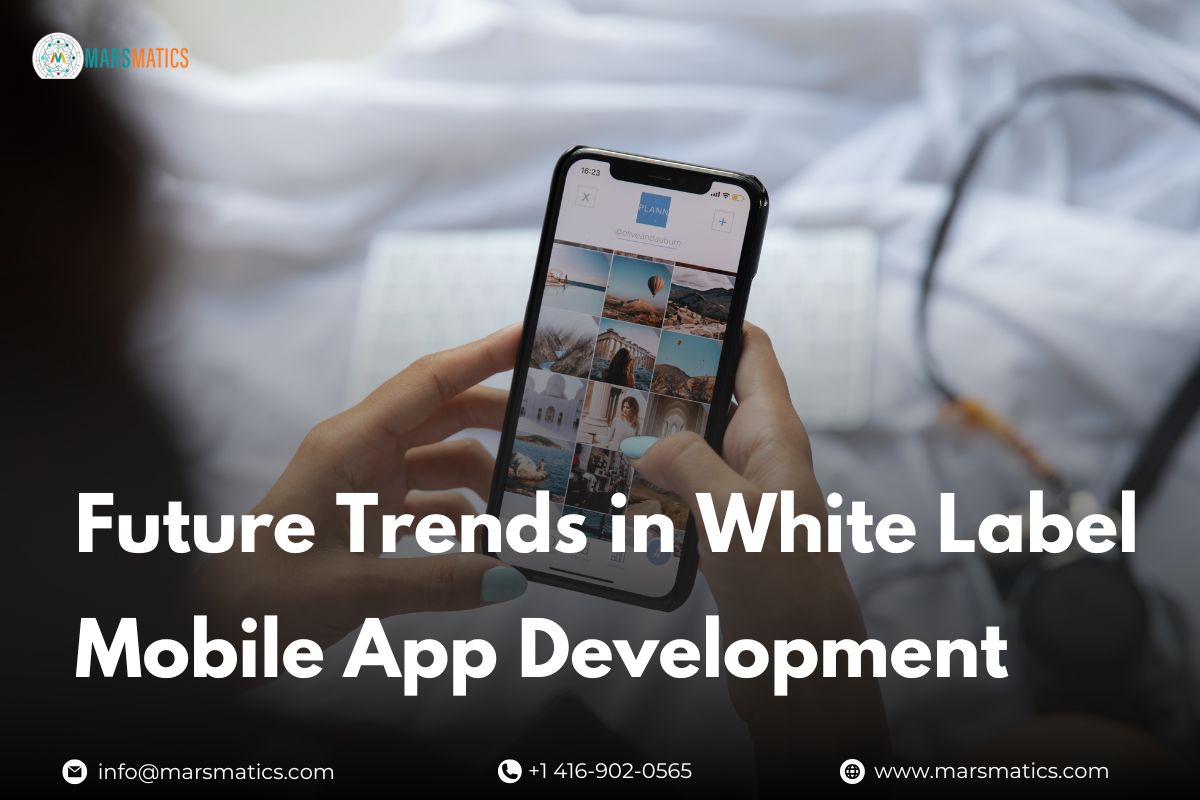Future Trends in White Label Mobile App Development
The demand for mobile apps is growing nowadays, and businesses need quick, reliable solutions to keep up. That’s where White Label Mobile App Development comes in. It allows companies to get fully-built apps customized to fit their needs, saving both time and money.
But the game is changing, white label mobile app trends like AI-powered features, better user interfaces, and seamless integrations are transforming how these apps are created and used. These trends make it easier for businesses to offer unique experiences without building everything from scratch. As technology continues to advance, white label solutions are becoming smarter, faster, and more innovative, making them a must-have for businesses ready to stay ahead.
Click here to read the difference between white label mobile apps and custom mobile apps 👉
What is white-label mobile app development?
White-label mobile app development refers to creating pre-designed mobile apps that can be customized and branded by different businesses. These apps are developed by one company and then sold or licensed to others who can rebrand them as their own.
The meaning of white label mobile app is simple, it’s a ready-made app solution that businesses can tweak to match their branding, saving time and costs compared to building an app from scratch. It’s a smart choice for companies looking to quickly launch professional apps without dealing with the complexities of development.
Examples:
- Zomato
- Shopify
- Cabify
- MyFitnessPal
- Eventbrite
Common Benefits of White Label Mobile App:
Here are some of the common benefits of using white label mobile apps:
| Benefit | Explanation |
|---|---|
| Saves Time and Money | White Label Mobile App Development allows businesses to launch apps faster and at a lower cost than building one from scratch. |
| Easy Customization | A White Label React App lets businesses change the design and branding without needing to develop an app from the ground up. |
| Ready to Use | White Label Solutions are fully built and ready for businesses to use right away, without waiting for long development times. |
| Scalable and Flexible | White-label apps can grow with your business, allowing you to add new features or integrate with other tools as needed. |
| Let Experts Handle It | White label mobile apps can help businesses to focus on their main goals, like selling products, while experts handle the app’s updates and maintenance. |
| Industry-Specific Features | Many white-label apps come with features that are already suited to your industry, such as e-commerce or fitness tools, making them easier to use for customers. |
Marsmatics will helps you in your mobile app development needs
Current State of White Label Mobile App Development:
Growth of White-Label Solutions: The white-label mobile app development market continues to grow as businesses seek to save time and reduce costs while still offering customized mobile solutions. This trend is gaining momentum, especially as companies in various industries, such as healthcare, e-commerce, and education, turn to these solutions for faster deployment and scalability.
Augmented Reality (AR) and Virtual Reality (VR): AR and VR are expected to become more mainstream in mobile apps, with AR playing a pivotal role in industries like retail (e.g., IKEA’s AR-powered shopping experience). The use of AR is set to increase, especially with technologies like LiDAR (Light Detection and Ranging) becoming more accessible on smartphones.
Wearable Tech: The trend of wearable devices on the rise, reaching over 900 million units globally by 2022, app developers are integrating mobile apps with wearable technologies more than ever. This trend highlights the growing demand for seamless connectivity and functionality across devices.
AI and Machine Learning: AI and machine learning are deeply embedded in mobile app development, driving innovations such as personalized experiences and data-driven decisions. The machine learning market alone is expected to grow at a CAGR of 42%, reaching nearly $9 billion, indicating its pivotal role in app development.
Mobile Entertainment and Gaming: Mobile entertainment and gaming apps continue to dominate. For instance, mobile gaming was forecasted to account for nearly 90% of all digital gamers in 2023, and apps like Netflix lead the charge in the entertainment sector.
Cloud-Based Mobile Apps: 94% of businesses already utilizing cloud technology, the mobile cloud market is set to grow at a CAGR of over 25% through 2029, providing a solid foundation for apps that rely on cloud storage and computing.
Future Trends in White Label Mobile App Development:
AI-Driven Customization:
AI is playing an increasingly significant role in White Label Mobile App Development by enabling apps to provide personalized experiences for users. With AI, apps can analyze user data, predict preferences, and offer tailored content or services, enhancing user satisfaction and engagement.
For example, an AI-powered White Label React app used by an e-commerce business can recommend products based on browsing history or previous purchases. This type of customization not only improves user experience but also boosts conversion rates, making apps more effective for businesses across industries.
Integration of IoT (Internet of Things):
As more devices become interconnected, from smart homes to wearables, the demand for apps that can control and monitor these devices is growing. White Label Mobile App Development is changing drastically to meet this need by enabling seamless communication between apps and IoT devices.
For instance, a white-label home automation app could allow users to control lights, thermostats, and security systems from their smartphones. This integration adds immense value for users and is a growing focus for businesses aiming to leverage IoT’s potential
Contact us know and get your white label mobile app developed seamlessly!
No-Code/Low-Code Platforms:
No-code and low-code platforms are gaining momentum in White Label Mobile App Development as they allow businesses to create mobile apps with minimal technical knowledge. These platforms enable users to design and customize apps by simply dragging and dropping features without writing complex code.
For example, a White Label React app could be built using a no-code platform, allowing non-developers to create tailored apps for their business needs. This trend lowers development costs and time, enabling more companies to deploy mobile apps quickly and efficiently.
Increased Focus on Security and Privacy:
As mobile apps continue to collect sensitive data, White Label Solutions are putting a greater emphasis on security and privacy. With increasing concerns over data breaches and privacy laws like GDPR, developers are prioritizing secure app design. This includes implementing encryption, two-factor authentication, and data anonymization.
For instance, a White Label Mobile App Development project for a financial service company might integrate advanced security features to ensure customer transactions are protected.
Progressive Web App (PWA) Integration:
Progressive Web Apps (PWAs) are revolutionizing White Label Mobile App Development by combining the best features of websites and mobile apps. PWAs allow users to access app-like experiences directly through a web browser, without the need to download an app from an app store.
They are fast, reliable, and offer offline functionality, making them a cost-effective and efficient solution for businesses. For example, a White Label React app developed as a PWA can provide seamless access to e-commerce sites, where users can browse products, add to cart, and make purchases even when not connected to the internet. PWAs eliminate the need for multiple versions of an app for different platforms, saving time and resources while offering a smooth user experience.
Augmented Reality (AR) and Virtual Reality (VR) Features:
Augmented Reality (AR) and Virtual Reality (VR) are becoming key elements in White Label Mobile App Development as they enhance user experiences in interactive and immersive ways. With AR, users can see digital information overlaid on the real world, while VR immerses users in a fully digital environment. Businesses are integrating AR and VR into mobile apps for industries like retail, real estate, and education.
For instance, a White Label React app for a furniture store might use AR to let users visualize how a piece of furniture would look in their home before purchasing.
Sustainability-Focused Development:
Sustainability is increasingly becoming a priority in White Label Solutions, especially as businesses and consumers become more eco-conscious. Mobile app developers are adopting green practices, such as optimizing code for energy efficiency, minimizing resource consumption, and using cloud services powered by renewable energy.
For example, a White Label Mobile App Development project for a sustainable fashion brand might focus on creating an app that helps consumers make eco-friendly shopping choices by offering sustainable product recommendations or tracking carbon footprints.
Also Read: What is mobile app development framework?
How to Choose the Right White Label Mobile App Provider?
If you are planning to launch a mobile app but don’t have the time or resources to build one from scratch? Well, a White Label Mobile App Development provider could be your saviour. The key is finding one that doesn’t just offer a generic, cookie-cutter solution, but a tailored app that reflects your unique brand and meets your business needs.
You’ll want a provider with strong White Label Solutions, proven expertise, and great support to keep things running smoothly. Marsmatics stands out as a leader in this field, offering custom solutions that save you time, effort, and maybe even a few headaches. Because, let’s be honest, no one wants an app that feels like it was built in a rush, especially not when it’s meant to represent your brand
Conclusion:
To wrap it up, White Label Mobile App Development is a smart solution for businesses looking to launch apps quickly and cost-effectively. Trends like AI, IoT, and improved security makes these white-label apps are becoming more powerful and customizable. White Label Solutions can help you get a customized app without the hassle of building it from scratch, helping you save time and resources. If you’re aiming for a scalable, secure, and easy-to-use app, opting for white-label development is a great way to stay ahead in the game.
FAQS
What is white-label mobile app development?
White-label mobile app development refers to creating pre-built apps that can be customized and rebranded by businesses to suit their needs, without developing the app from scratch. It allows companies to save time and resources while launching a functional, ready-to-use mobile app.
Are white-label apps scalable for growing businesses?
Yes, white-label apps are scalable. They can be easily customized and expanded as businesses grow, offering features like increased user capacity and additional functionality to meet the needs of a growing customer base.
Are white-label apps secure for sensitive data?
White-label apps can be secure, but it depends on the provider. Reputable developers implement security measures like encryption, secure data storage, and regular updates to ensure the protection of sensitive data.
Can white-label apps integrate with IoT devices?
Yes, white-label apps can integrate with IoT devices. Many modern white-label solutions offer the flexibility to connect with IoT technologies, allowing users to control and interact with smart devices directly through the app.









